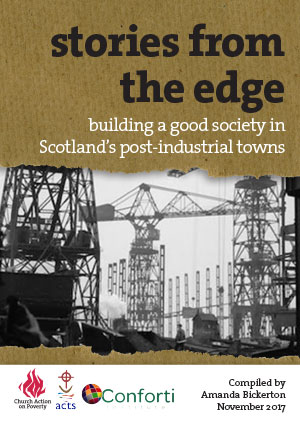Stories from the Edge
 Faith communities in post-industrial towns across Scotland are delivering social action to tackle the effects of poverty. On 12 October 2017, in partnership with Action of Churches Together in Scotland and the Conforti Institute, we hosted a gathering of faith-inspired social activists from Scotland’s post-industrial towns alongside leaders from church and civic society, to explore, reflect and share experiences.
Faith communities in post-industrial towns across Scotland are delivering social action to tackle the effects of poverty. On 12 October 2017, in partnership with Action of Churches Together in Scotland and the Conforti Institute, we hosted a gathering of faith-inspired social activists from Scotland’s post-industrial towns alongside leaders from church and civic society, to explore, reflect and share experiences.
Read more in our Stories from the Edge report.
 Faith communities in post-industrial towns across Scotland are delivering social action to tackle the effects of poverty. Many of these projects are dealing with an ever-growing need and are stretched thin. Everyone is aware of the effects of poverty in big cities, but less attention is paid to the towns which were the heartlands of manufacturing industry.
Faith communities in post-industrial towns across Scotland are delivering social action to tackle the effects of poverty. Many of these projects are dealing with an ever-growing need and are stretched thin. Everyone is aware of the effects of poverty in big cities, but less attention is paid to the towns which were the heartlands of manufacturing industry.
 The conference began with reflections from two contrasting projects in post-industrial towns. The Reverend David Gifford, Rector of St Mary’s Scottish Episcopal Church in Port Glasgow, Inverclyde, told us about the Clydemen, a lunch club for former shipyard workers and allied trades, which has more than 90 men registered. He told us about the disappearance of the old industries, and the changes in the landscape which have erased the physical reminders of the once-mighty Lower Clyde, where at one time 70% of the ships sailing the ocean were built. He spoke of the alienation and isolation of the men who built the ships, with loss of identity and a legacy of alcohol abuse and ill health. The Lunch Club is about the history and the proud industrial heritage of Port Glasgow, but it has a far more important role:
The conference began with reflections from two contrasting projects in post-industrial towns. The Reverend David Gifford, Rector of St Mary’s Scottish Episcopal Church in Port Glasgow, Inverclyde, told us about the Clydemen, a lunch club for former shipyard workers and allied trades, which has more than 90 men registered. He told us about the disappearance of the old industries, and the changes in the landscape which have erased the physical reminders of the once-mighty Lower Clyde, where at one time 70% of the ships sailing the ocean were built. He spoke of the alienation and isolation of the men who built the ships, with loss of identity and a legacy of alcohol abuse and ill health. The Lunch Club is about the history and the proud industrial heritage of Port Glasgow, but it has a far more important role:
“It may not be the sound of rivets and clanging steel you hear at Clydemen these days, but the men chatting and reminiscing – and believing in themselves again.”
 David Spink, a retired bank manager, shared the story of the Havilah project in Arbroath. He told us about the drop-in service open to anyone seeking company and non-judgemental listening. Many of the people there have issues with drug and alcohol addiction, others are just lonely. All are welcome. The name ‘Havilah’ is a place “where there is gold” – David felt that it was appropriate. Many of the people who come to the project are the most marginalised in their communities, and perceived very negatively, but in all of them there is gold.
David Spink, a retired bank manager, shared the story of the Havilah project in Arbroath. He told us about the drop-in service open to anyone seeking company and non-judgemental listening. Many of the people there have issues with drug and alcohol addiction, others are just lonely. All are welcome. The name ‘Havilah’ is a place “where there is gold” – David felt that it was appropriate. Many of the people who come to the project are the most marginalised in their communities, and perceived very negatively, but in all of them there is gold.

After being inspired by the stories told, the gathering worked together to address a number of questions…
Read more in our Stories from the Edge report.

Comments (01)
Comments are closed.